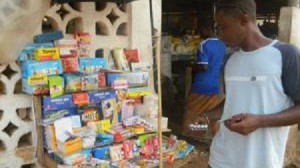Counterfeit Drugs: a headache for Liberia
Liberia’s Ministry of Health is launching a major crackdown on counterfeit drug sellers throughout the country, but Liberians say they have no choice but to buy such drugs, given their low cost and availability even in rural areas.
In late 2013, the health ministry and the Pharmaceutical Board of Liberia intensified a campaign that began in July that year cracking down on peddlers of fake drugs. The campaign involved teams of monitors touring the country to ensure counterfeit drugs are not being sold, and raising awareness of the dangers of drugs bought on the street.
“I am always on the radio to alert people and to inform the general public that buying medicine on the street is not good for them,” Reverend Tijli Tarty Tyee, a chief pharmacist, told IRIN. “It is harmful and will compromise your health.”
He continued: “The problem is, everyone wants short cuts, but these shortcuts are dangerous to them. It is better to go to certified pharmaceutical institutions, and you will be given better service.”
Most sellers peddle on the streets from black bags or open bags, both in towns and villages. The medicines they sell – the bulk of them to treat malaria – are either past their expiration date or are counterfeit drugs coming from Guinea and Nigeria.
Tyee said peddlers do not always succumb without a fight, and government teams do not have enough vehicles to travel countrywide, but they remain undeterred. “This is not an easy thing. We send our inspectors out there to raid the street, and some of them are wounded. There can be a serious combat,” he told IRIN. “But we are not relenting. We will continue to engage the process and I am confident that in the soonest possible time that situation you see out there will be arrested and brought under control.”
The Health Products Regulatory Authority, which has the power to arrest sellers and confiscate fake drugs, has arrested 10 people thus far. It is a criminal offense to sell counterfeit drugs in Liberia.
The authority has set up a “condemned room”. “If you go to the authority office now, you’ll see the room is filled to capacity with medicine[s] that were confiscated from drugs peddlers,” Tyee told IRIN.
Fake malaria drugs risk eroding international efforts to curb the disease, said David Sumo, the managing director of the Liberia Medicines and Health Products Regulatory Authority. The drugs are ineffective, causing the disease to spread further and weak formulations of actual antimalarial medicines can promote drug resistance.
Melvin Saydee, a doctor in Grand Gedeh Medical Centre in Monrovia, told IRIN, “Many of our patients who come from these villages admit to us that they buy the fake drugs and their health never improves at all.”
“No option”
But buyers and sellers said they had no choice but to take part in the counterfeit trade.
Paynesville resident Kelvin Gibson told IRIN: “I have no option… When I buy anti malaria drugs in a pharmacy, it is sold for US$3, but when I buy it on the street it’s just $1.50.”
Others say legitimate drugs are simply not available in some areas. Famatta Wesseh lives in Mount Barclay, on the outskirts of Monrovia, where there are no health clinics. She welcomes the street peddlers. “These fake drugs sellers are greatly helping us. When we get sick, we buy the medicine from them… We feel this is dangerous but… since the war, the government has turned its back on us.”
Street peddler Miatta Holder is a single parent of four. Her husband died during the war in Monrovia, and since then things have been very difficult for her, she told IRIN. “This is the only means I have to cater to my children. I’m not getting help from anyone,” she said. “I agree that this is illegal but I have no other means to survive, so I hope the government can leave us alone.”
Other sellers gave similar stories. Tumpo Harmon, 35, father of three, said it is his only way to make a living. “Things are getting more difficult by the day in Liberia. The government has failed to provide jobs for us, and we need to survive. We have families to feed and we need to send our children to school.”
Some feel they are doing a good service and downplay the potential negative impact of their trade. Saah Tamba, 48, has been selling drugs for over a decade, taking his medicine bucket from village to village. “I’m an old hand in this business… We’re helping the government reach places where there are no hospitals or clinics. So let them leave us alone,” he told IRIN.
He sells drugs every day, he said, and unless the government supplies him with an alternative, “I will continue to sell these drugs.”
Doctors join the cause
Doctors are joining the fight, raising awareness of the dangers of counterfeit drugs. Every morning, Saydee’s team takes 30 minutes before receiving patients to warn those waiting for care of the harmful effects of counterfeit drugs.
Tyee said the government and its partners are making frantic efforts to ensure that sufficient quantities of legitimate drugs are available in the country.
Liberian President Ellen Johnson-Sirleaf is chair of the African Leaders Malaria Alliance, in which African leaders have pledged to end deaths from malaria in their countries.
Malaria is one of the top three killer of children under age five in Africa, according to the UN.


